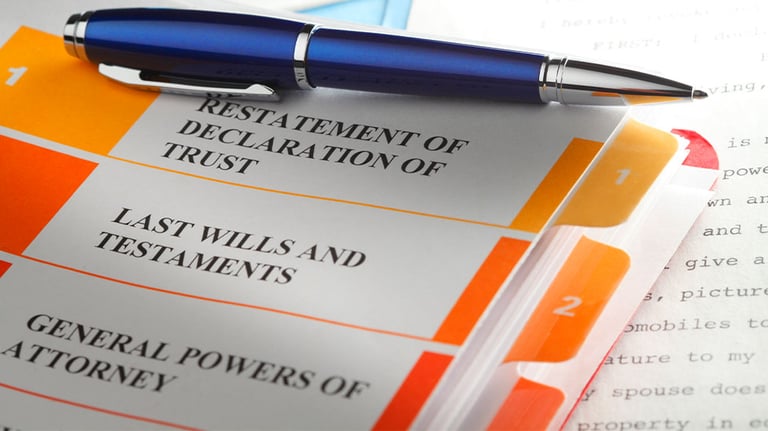How To Start Your Estate Planning—A Step-By-Step Guide
Estate planning, wills and trusts, advance directives, and more


Your comprehensive estate plan is not just a document; it's a reflection of your values, your legacy, and your care for your loved ones. As such, it requires time, dedication, and thoughtfulness so that each detail is in accordance with your desires. When approached with wisdom and professional guidance, an estate plan can provide security for your family and peace of mind as you move through life.

Get organized
The first step is to compile your essential documents, including bank statements, investment portfolios, real estate deeds, insurance policies, retirement account statements, and any outstanding debts or loans. Organizing these documents will give you a clear overview of your financial situation.
In addition, it's advisable to make a list of valuable personal belongings, heirlooms, or items of sentimental value. While not strictly financial, these are items of significant value you likely have specific intentions for distributing among heirs. When doing so, supplement your list with pictures to clarify the contents of your trust and/or will.
Remember to assign values to your assets as accurately as possible. For example, you may need an appraisal for properties, businesses, or valuable collectibles.
Seek guidance
The legal landscape of estate planning is complex and changes regularly. As a result, it's wise to meet with an experienced estate planning attorney for guidance. They will be able to provide tailored advice based on your specific situation.
For example, they can help you complete an advance directive, which provides a structure for your medical and financial wellness if you become incapacitated. Additionally, it's recommended to hire a financial advisor and a tax professional for insights on tax implications and financial strategies.

Document your health care wishes
Documenting your health care wishes is one of the most critical and often ignored aspects of estate planning. It ensures that your preferences for medical treatment are known and followed in the event that you're unable to communicate them yourself.
Your health care wishes, also known as an advance directive, needs legal documentation to become valid. A living will is the document you'll use to record your advance directive, covering scenarios like life support, resuscitation, organ donation, and pain management.
In addition, it's crucial to appoint a durable power of attorney for health care. This trusted individual (known as a health care proxy or agent) makes medical decisions on your behalf if you're incapacitated. They'll follow your living will and make decisions based on your best interests and values if the document is unclear or insufficient in a particular situation.
You can also complete a document stating your doctor's medical orders for life-sustaining treatment (MOLST) to govern your medical treatment if you become terminally ill. While this document doesn't have legal clout, it provides physicians with specific instructions for your care.
Select an executor
Your executor is responsible for carrying out your wishes as stated in your will. Therefore, they should be someone you trust deeply, such as a family member, close friend, or attorney. It's vital to discuss executorship with this person before legally declaring them your executor. You can also change your executor or add a co-executor whenever you like.
Remember to bring your executor to meetings with bankers, appraisers, and attorneys. Doing so will familiarize them with your estate and equip them to make the best decisions when administrating your will. In addition, inform your heirs about who your executor is to prevent surprises and friction after you pass away.

Draft your will and complete other legal documents
With the above steps completed, you can draft a detailed will. This document specifies how you want your assets to be distributed after your passing. It can also designate a power of attorney to manage your financial affairs if you become incapacitated.
Additionally, you can create a living revocable trust if you have substantial assets or specific wishes for managing and distributing them. A trust works together with your will, providing thorough instructions about your estate.
For example, a will may list your grandchildren as beneficiaries, but a trust can lay out when they should receive their inheritance (such as a specific age). Plus, a trust will keep your estate out of the probate process, which can be costly and time consuming.
However, a trust is not sufficient on its own, as it can't include instructions for the care of minor children and funeral arrangements. A will is the only document that can list these designations.
Create a “Need to know ” file
This file should contain copies of all your vital documents, account numbers, passwords, contact information for professionals (attorney, financial advisor), and any specific instructions you have. A locked safe is an ideal container for this file. Here are the specific documents it should contain:
- Health care, trustee, and power of attorney forms
- Life insurance policies
- Contact information for medical professionals, attorneys, accountants, financial advisors, and life insurance agents
- Recent bank, investment, mortgage, and loan statements
- Credit card numbers, passwords, and PINs for these accounts
- Login credentials for all of your online accounts
- Interment agreements you’ve already made with a funeral home or cemetery
- Information on where to find your vehicle titles, deeds, mortgage documents, and past tax returns
- If you’re a business owner, a copy of succession plans and where to find ownership-related documentation
Review and assess regularly
Lastly, set a regular schedule to review your estate plan. Major life events (marriages, divorces, births, deaths, etc.) or changes in laws may necessitate updates. Your estate planning attorney can keep you abreast of any tax or financial regulation changes that might impact your estate plan.
